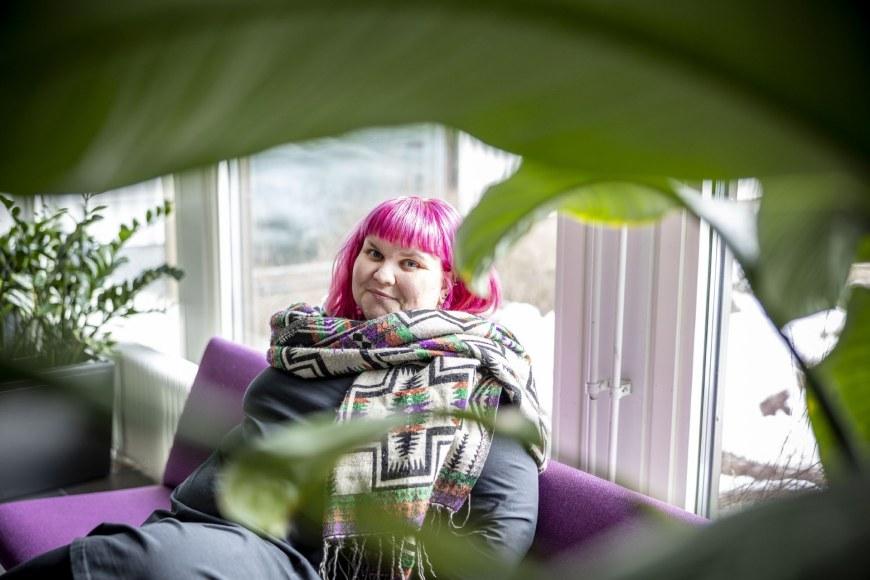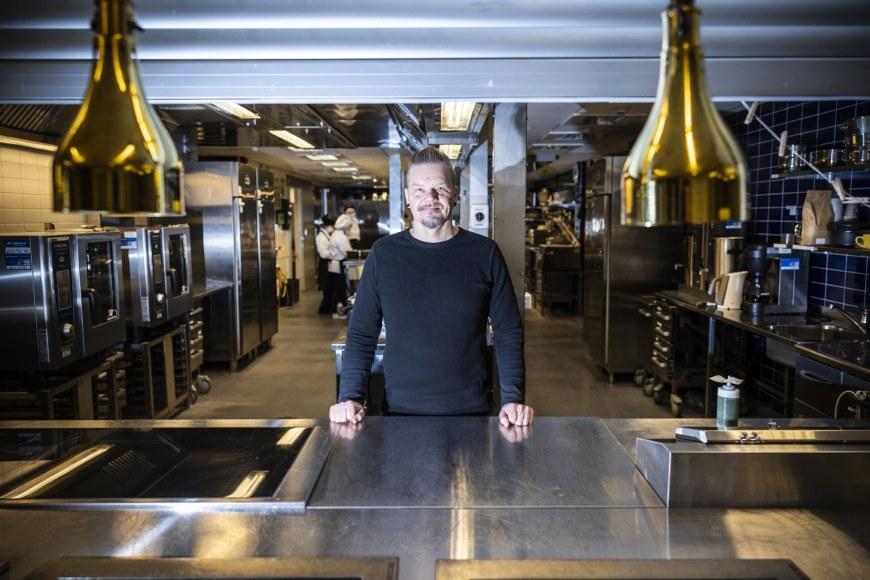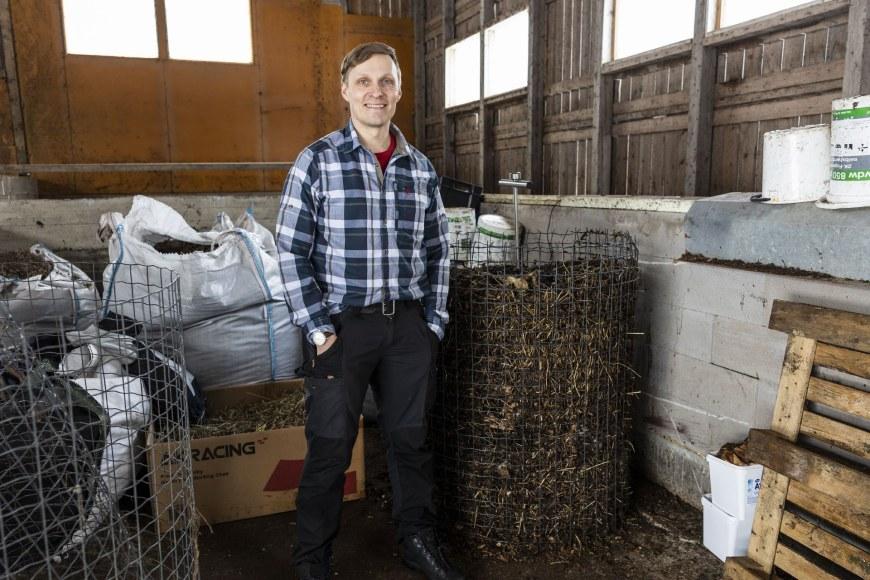Fancy a plate of locally grown, sustainable foods? How our diets need to change so we can meet the world’s growing demand for food

This article was originally published in Unit, the magazine of Tampere Universities.
There is a persistent belief that food comes from farm to plate, but the majority of the world’s food is consumed in cities and the demand for food is expected to double by 2050.
How can cities contribute to the development of sustainable, safe and healthy food systems? The City of Tampere takes on the challenge in a project titled Fostering the Urban Food System Transformation through Innovative Living Labs Implementation (FUSILLI), which involves 12 European cities and their stakeholders.
“As there are only a few major food companies in and around Tampere, we have given little thought to how we contribute to food systems. Still, cities have three key roles in food systems,” says Karoliina Tuukkanen, project manager working for the City of Tampere.
A food system is a complex web of actions and interactions along the food value chain, including production, retailing, consumption and the related regulations, practices and attitudes.
Cities play a pivotal role in food systems
The first role of a city in the food system is as a provider of food services.
For example, the City of Tampere is one of the owners of Pirkanmaan Voimia, which delivers 12 million meals each year to schools, daycare centres, hospitals and residential care homes. Through Voimia, the City has a major impact on what the local residents eat.
The second role is related to land policy. Tampere owns allotments and community gardens where the residents can grow food.
“The allotments produce relatively small amounts of food but help us appreciate all that goes into growing the food that sustains us,” Tuukkanen says.

The third role is related to education. The food that is served in daycare centres and schools and the way food is talked about in the classroom affects children’s and adolescents’ attitudes towards food.
During the FUSILLI project, these three roles of the City of Tampere will be examined from both strategic and practical perspectives. The project participants will look into the City’s strategic guidelines on food systems and whether new ones must be drawn up to prepare for the future. They will also set up a living lab that will serve as a practical platform for testing and demonstrating the components of a sustainable food system.
A planetary plate
Many of us associate sustainable eating with a vegetarian diet, but meat and dairy products are unlikely to ever fully disappear from our plates.
When food systems are developed, it is also important to consider people’s socioeconomic status, individual preferences and freedom of choice. As not everyone can afford to buy small-scale farmers’ produce and relatively few people are prepared to spend time growing their own food, the FUSILLI project seeks to encourage the adoption of the planetary health diet instead of a strictly vegetarian diet.
The planetary health diet is flexitarian diet that is largely plant-based but can include moderate amounts of animal-source foods, such as freshwater fish. The diet was created by the EAT-Lancet Commission to draw up guidelines that provide nutritious food to the world’s fast-growing population while protecting both the environment and animals. It is also important to ensure that food production is profitable for farmers.
Tuukkanen expects food service companies to increasingly shift towards the planetary health diet in the future.
“Cities have a major impact on the sustainability of food systems through the procurement of food and catering services. In fact, they are already increasingly buying locally sourced food.”
Change begins with education
Tampere University of Applied Sciences (TAMK) is one of the partners involved in the FUSILLI project.
Mikael Lindell, project manager and team coach at TAMK’s Proakatemia, believes that the transition to sustainable food systems can be accelerated by raising awareness among students who are working towards the degree of Bachelor of Hospitality Management. The closer the integration of sustainable development into the curriculum, the more likely the students are to follow the same principles once they enter the professional world.
“The younger generations tend to be more environmentally conscious than the older generations and likely to be more willing to make sustainable food choices in the future.”
Lindell and his students have considered what sustainable business models could mean for the restaurant industry and the food service industry. The assignment inspired students to come up with the concept of an eco-clock, or an annual cycle for sustainable development activities. The eco-clock, which can be customised to different business models, reminds companies to make responsible choices throughout the year, such as favour fresh seasonal produce.

Now that the Covid-19 restrictions on restaurants have been eased, the themes covered by the FUSILLI project will also come to life at the TAMK Catering Studio, a learning environment for students pursuing the degree of Bachelor of Hospitality Management at TAMK. The Catering Studio hosts events and offers services for Tampere Universities and external stakeholders. For example, food courses and theme days are organised at the Catering Studio.
Nudge, don’t judge
For many of us, food is an effective trigger of emotions, so dietary changes should not be forced. Lindell talks about nudging, which is aimed at making healthy choices easier without restricting consumers’ freedom of choice.
For example, vegetarian options can be given greater prominence than meat dishes in lunch restaurants. When vegetarian dishes are presented as a neutral option alongside meat dishes, indecisive diners are more likely to opt for plant-based food, whereas ranting about the superiority of a vegetarian diet can irritate people, causing them to purposely ignore vegetarian options on the menu.
Lindell cites Café & Bar KATTO in Tampere as an example of nudging and future food trends. The restaurant, established as a result of Proakatemia’s student project, grows some of its own produce and favours domestic and locally sourced ingredients. For example, customers can order a baked potato with vegetable or meat filling and the vegetable option is presented first on the menu. Still, customers are not being pressured into choosing plant-based foods.
Lindell believes that recipes will evolve in the future, making the planetary health diet a feasible option to all people regardless of income level. We do not all have to become passionate foodies, because ready-made meals and restaurant foods will also become more environmentally friendly.
Change in values
The Ahlman Vocational and Adult College also participates in the FUSILLI project. Antti Luomala, project manager at Ahlman, has a background in social sciences and smallholder agriculture. He examines the sustainability of food systems from the perspectives of soil management and food markets.
Sustainable food production also means taking care of soil and livestock. Based on current knowledge, we need to reduce soil tillage and the use of chemical fertilisers, pesticides and herbicides. Without healthy soil, it is impossible to sustainably produce enough nutrient-rich foods to the growing population.
“The power structure of the food value chain should also be adjusted. Now the food processing industry and the food retail industry are faring well, whereas the overwhelming majority of farmers are struggling to make ends meet. Increased regulatory governance and the allocation of agricultural subsidies to steer the sector have distorted the market.”
Luomala calls into question the idea that food comes from farm to plate. The majority of farms produce raw materials for the food processing industry and wholesalers, which prefer to deal with farmers that are able to produce large quantities of produce at an affordable price. Direct-to-consumer sales is a labour-intensive process and requires farmers to productise, brand, refine and package their produce and manage the bureaucracy – a tall order.
Changes will not happen overnight, because the food value chain is a complex system that has evolved over decades and involves government subsidies and restrictions, consumer behaviour and farmers’ own activities. The fact that intensive farming practices speed up soil degradation and cut into farmers’ earnings cannot be pinned on a single culprit. We are all to blame.
Sustainable soil
Although there is no silver bullet for creating sustainable food systems, Luomala does not have a pessimistic outlook on the future.
“There are signs that long food supply chains and industrial agriculture are being reformed. Direct-to-consumer sales and short food supply chains are becoming more common.”

Large-scale farming is here to stay because there will always be demand for cheap food. Grocery stores are not likely to disappear either. Still, Luomala hopes and believes that in the future consumers will buy more local foods grown by small-scale farmers. He also expects us to have a better understanding of soil management.
“An improved knowledge of soil will enable us to promote sustainable food production at all scales. Fertile and biologically diverse soil yields more nutrient-dense crops. Food grown on the chemical industry’s terms lacks the enzymes and microbes we need. Thought patterns and habits change slowly but surely.”
Gardens for farms
Luomala finds it unlikely that cellular agriculture, indoor farming or urban rooftop gardens could ever feed a substantial number of people, but forest gardens and productive gardens run alongside farms hold real potential to increase food production.
Ahlman’s permanent small-scale garden where vegetables are grown in beds is a part of the living lab set up for the FUSILLI project and a perfect example of regenerative agriculture. Soil preparation is kept to a minimum, and cover crops are planted to provide ground cover. The soil is conditioned with compost and compost extract and cared for using regenerative agricultural techniques.
Such a garden can produce a large yield despite the small patch of land, generally 0.5 to 2 hectares. Small-scale vegetable farming is a viable option, for example, for cattle farms that can use manure as fertiliser and do not need to buy industrial fertilisers or plant protection products.
“Sustainable vegetable farming is difficult without keeping livestock. Composted manure is essential for maintaining soil fertility. So is the optimised allocation of pasture.”
Fostering the Urban Food System Transformation through Innovative Living Labs Implementation (FUSILLI)
- The project is funded under the EU’s Horizon 2020 research and innovation programme
- The project involves 34 partners from 12 countries in Europe.
- The Finnish partners are the City of Tampere, Tampere University of Applied Sciences, Ahlman and Ekokumppanit.
- The project participants will set up a living lab in Tampere for testing sustainable food system solutions and developing new innovations.
Author: Janica Brander








